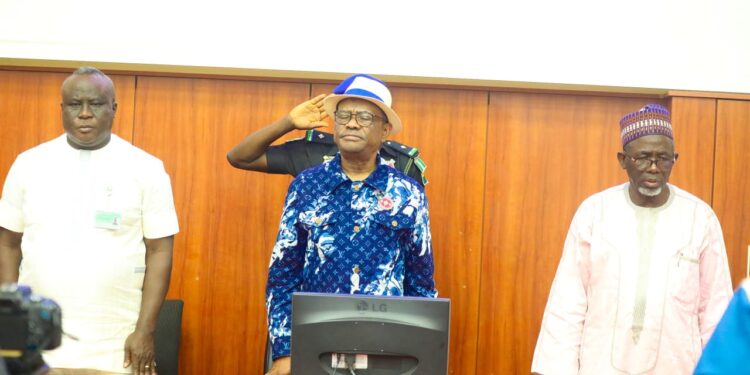The Minister of the Federal Capital Territory (FCT) Barr Nyesom Wike has taken a stand on the issuance of Certificate of Occupancy (CofO) stating that within a period of four months, he has saved N110 billion as minister.
According to Wike, the FCT Administration is sanitising the process of issuing of C of O in the FCT.
The FCT Minister stated this during an interactive session with Estate Developers and Residents’ Associations in the FCT at the FCDA Conference Hall in Abuja on Tuesday, November 21, 2023.
In his opening remarks, the Senior Special Assistant to the Minister on Land, urban and Regional Planning, Sir Michael Chinda, who is also the Chairman of the Ministerial Task Force on Issuance of C of O for Mass Housing and the Recovery of Land Use Contravention fees said the meeting was called at the behest of the FCT Minister in order to resolve disagreement between the Task Force and the developers and residents’ association for the payment of N5 million Naira as fees for the collection of C of Os.
But Wike lamented that the issuance of C of O in the FCT was enmeshed in a lot of controversy which sometimes led to crises. He said, “One of the reasons I have stopped signing is because I don’t trust those C of Os they are bringing for me to sign. I don’t want to sign a C of O that has been given to another person.”
He therefore vowed that very tough decisions will be taken to resolve the crisis and restore the integrity of the system, however after consideration of requests raised by residents at the meeting, Barrister Wike extended the period of time to pay for the C of O from 3 to 4 months,
Wike reminded the participants at the meeting that the FCT as a non-oil State relies on revenue generation for development activities and warned that the four-month period would not be extended.
“I want to stand firm and tell you this; I’ve ended at four months. It will not go beyond four months,” Wike said.
On the suggestion by the residents that the flat rate of N5 million for the issuance of C of Os should be reviewed to reflect the size and location of the property, the Minister insisted that a C of O is a business and security document which is not necessarily graded according to the size of the property or its location, and insisted that a flat rate of N5 million must be paid for its collection. He however hinted at the possibility of a review of this sum.
He said, “If you want to have a C of O, which is a security and business document, it is not graded based on one bedroom flat or two-bedroom flat.
The Minister also stated that he will seek the approval of the President for C of Os to be linked to the National Identity Number, NIN for ease of identification and other issues of taxation and security.
Also speaking on the prudence adopted in the management of finances, Barrister Wike revealed that the FCT Administration in the last three months has saved not less than N110 billion for the FCT.
He said the money will be attached to projects to accelerate their completion.
The Minister said, “Three months in office, I can tell you authoritatively, I have saved not less than N110 billion for FCT and this money will be attached to projects so that people will see indeed that the taxes we are paying are being utilized for the interest of the people”.
He also disclosed that the FCT would be rolling out its buses and taxi scheme in the next one month, adding that the menace of one-chance would soon be a thing of the past in the FCT.
“These buses and taxis will ply all the routes in Asokoro, Maitama, we are kicking out Keke Napep at least in these areas. Some of these Keke Napep are agents of criminals,” Wike said, adding that as part of plans to create more infrastructure in the Area Councils and discourage people from migration into the city, Wike added: “If we have the buses, people will prefer to come from their areas and come to work and go back”.
Wike, therefore, urged FCT residents to cooperate with the Administration by paying their taxes in order to improve service delivery, adding that, “It is painful but it’s an inconvenience that we must face.”
In their separate remarks, the residents commended the FCT Minister over the steps he has taken to sanitize land administration in the FCT.
While appealing for the review of the C of O fees, some residents also pleaded with the Minister to consider their plights as civil servants and retirees, who have taken mortgage facilities from the banks and as such do not have the funds to pay for the C of Os.
A statement issued by the Director of Press in the office of the FCT minister, Anthony Ogunleye, said other concerns raised by the residents also include the absence of infrastructure in the Estates, security related issues and other fraudulent practices by estate developers in connivance with some government officials.
The meeting was attended by the Senior special Assistant to the FCT Minister on Land, Urban and Regional Planning, Estate Surveyor Michael Chinda, the Executive Director FCDA, Engr. Shehu Ahmad Hadi, Directors, Heads of Agencies and other senior officials of the FCT Administration.











